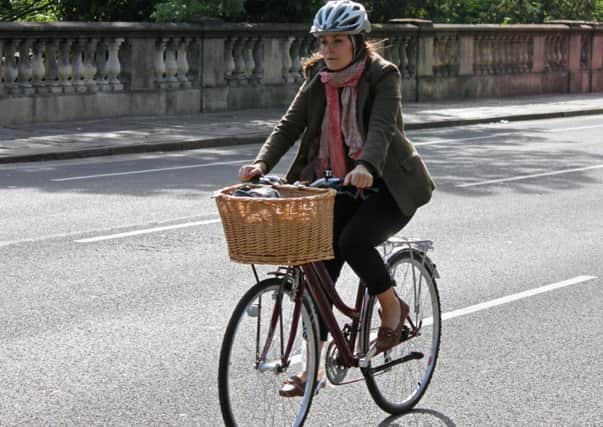Brenda Mitchell: Reclaim our roads with Presumed Liability


But what was an opportunity for Scotland to take a stand on social justice and join the rest of Europe by embracing presumed liability may now be eclipsed, as policy makers, lawyers and insurance companies south of the Border take up the call for change.
With Scotland heading towards parliamentary elections, this is a good a time to underline why a system of presumed liability is the right course of action if we believe in putting people (rather than cars) first.
Advertisement
Hide AdAdvertisement
Hide AdScotland’s major cities currently have some of the UK’s worst records for pedestrians hit by motor vehicles and it is statistically proven that walking is more dangerous than driving a car in Scotland. Glasgow, for instance, ranks 9th worst in the UK with 86 pedestrians killed or seriously injured per 100,000 population against an average for UK cities of 46.
Cycling is no easier. In 2014, serious injury to cyclists in Scotland was nearly 16% higher than the 2004-2008 average, with 155 reported cases, and can only partly be explained by higher levels of cycling.
This is despite the existence of both a Cycling Action Plan and a National Transport Strategy that seek to encourage healthy travel choices and tackle climate change.
We clearly live in a world where there is both an aspiration and a desperate need for safer and more sustainable active travel and yet this is also a world where the roads are perceived to “belong” to the car.
The current system of civil law in relation to road traffic collisions requires vulnerable road users – the injured and the bereaved – to prove the case against the more powerful, which in most situations is the motorist’s insurance company. This is out of date and inherently unjust. Under presumed liability, it is for the more powerful to prove that the vulnerable road user is liable for any damage or injury.
The experience of solicitors like myself, who represent people who have often had life-changing injuries or lost loved ones, is that the legal system has created a David and Goliath culture. As a result, the odds are frequently stacked against the vulnerable and receiving compensation quickly and fairly in many cases is impossible without resort to litigation, adding to the distress of those who have been injured through no fault of their own.
Consider 67-year-old Alexander Gibson, who was forced into a long drawn out court battle with the insurance company of a mini-bus driver, who police failed to investigate properly at the time but was later found to have struck his bike from behind and been responsible for causing the serious injuries Gibson suffered.
Or Sally Low, a single mother of two teenage boys who was killed whilst cycling in September 2013 and whose family had to wait nearly two years for any financial settlement from the drivers’ insurance company.
Advertisement
Hide AdAdvertisement
Hide AdIn each case, it was for the victim or the victim’s family to demonstrate that the driver was at fault and in each case the insurance company took an entrenched view thus denying any opportunity for a swift and fair settlement and resulting in a court battle that under Presumed Liability would have been avoidable.
It is not about attaching blame, but about liability in law and compensating vulnerable road users quickly and effectively. Under Presumed Liability, the burden of proof is merely reversed. If liability is split and negligence is found to be with both parties, then presumed liability allows for that. Importantly, if a cyclist or pedestrian is the author of his or her own misfortune, then liability is avoided and no compensation is awarded.
The Scottish Government has an opportunity to lead the way with legislative changes which would provide additional protection for the vulnerable on our roads. Now that the likes of cyclist and British Cycling Policy Adviser Chris Boardman and former Director of Pubic Prosecutions and now Labour MP, Sir Keir Starmer QC, are joining calls for presumed liability as a possible way forward, where we were once leading the peloton, we might end up following the pack. «